If you’ve noticed your basil leaves turning white, you may be wondering what’s causing the problem. There are a few different reasons why this may happen, but luckily, there are also a few different solutions. In this article, we’ll go over 13 different causes of white basil leaves, as well as their corresponding solutions.
Temperature Stress
When the temperature outside begins to rise, so does the temperature of the leaves on your basil plants. If the leaves turn white, it’s a sign that the plant is under stress.
There are a few things that can cause this temperature stress:
1. The plant is not getting enough water.
When the temperature rises, the plant’s leaves will begin to lose moisture. If the plant is not getting enough water, the leaves will turn white as a result of the stress.
The plant is not getting enough sunlight. 2.
Basil plants need a lot of sunlight to thrive. If the plant is not getting enough sunlight, the leaves will turn white as a result of the stress.
The plant is not getting enough nutrients. 3.
Basil plants need a lot of nutrients to thrive. If the plant is not getting enough nutrients, the leaves will turn white as a result of the stress.
4. The plant is under attack from pests.
If the plant is under attack from pests, the leaves will turn white as a result of the stress.
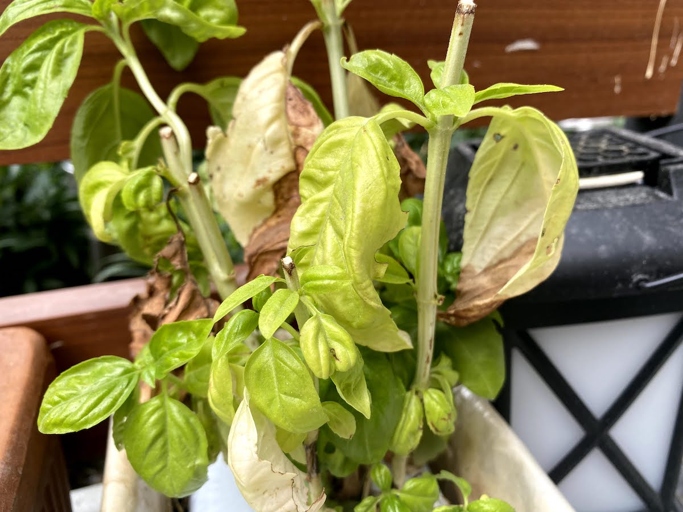
The plant is under attack from diseases. 5.
If the plant is under attack from diseases, the leaves will turn white as a result of the stress.
Otherwise, the plant will continue to suffer and may eventually die. If you notice that the leaves on your basil plants are turning white, it’s important to take action to correct the problem.
Solution:
But don’t worry, there are solutions for each problem. If your basil leaves are turning white, it could be due to one of several reasons.
If your basil is not getting enough sun, move it to a brighter spot. One common reason for basil leaves turning white is due to a lack of sunlight. Basil is a sun-loving plant, so it needs at least six hours of sunlight each day.
Basil doesn’t like to sit in wet soil, so make sure you’re not over-watering it. Another reason for basil leaves to turn white is because of too much water. Allow the top inch of soil to dry out before watering again.
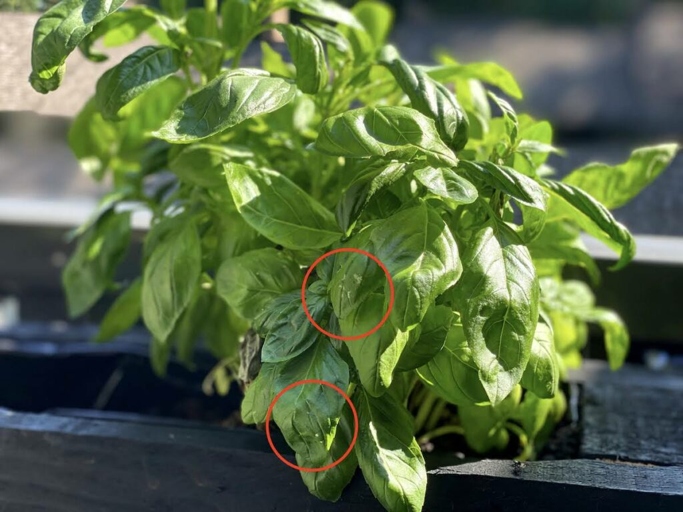
With a little trial and error, you should be able to get your basil plant back to its healthy, green self in no time. If your basil leaves are turning white and you can’t figure out why, try one of these solutions.
Downy Mildew
Downy mildew can spread rapidly and can quickly kill a basil plant if left untreated. Downy mildew is a type of fungal disease that affects a wide range of plants, including basil. This disease is characterized by the appearance of white, powdery patches on the leaves of affected plants.
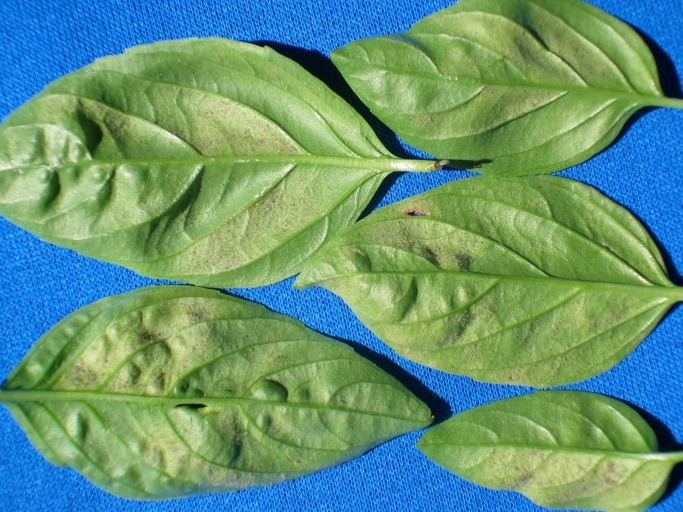
There are a number of ways to prevent and treat downy mildew on basil plants. This helps to reduce the amount of moisture that the leaves are exposed to. If downy mildew does occur, it is important to remove affected leaves and to treat the plant with a fungicide. One of the best ways to prevent the disease is to water basil plants at the base, rather than from above.
Solution:
If your basil leaves are turning white, it could be caused by any number of things. But don’t worry, there are solutions for each problem.
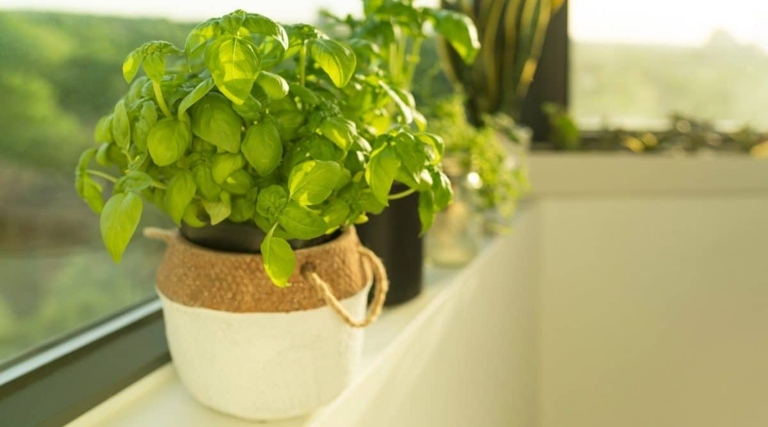
Basil needs at least six hours of sunlight each day, so if it’s not getting enough, the leaves will start to turn white. One common issue is that the plant isn’t getting enough sunlight. The solution is simple – just move the plant to a sunnier spot.
Basil likes to stay on the drier side, so if it’s getting too much water, the leaves will start to turn white and eventually fall off. Another issue could be that the plant is getting too much water. The solution is to water the plant less often, or to move it to a pot with better drainage.
This will help the plant get the nutrients it needs. You can also try misting the leaves with water, which will help them stay healthy and green. One is to add some organic matter to the soil, like compost or manure. If you’re still having trouble, there are a few other things you can try.
Whatever the problem is, there’s a solution for it. With a little troubleshooting, you can get your basil plant back to its healthy self in no time.
Fusarium Wilt
The fungus then spreads up the plant, causing the leaves to turn white and eventually die. Fusarium wilt is a soil-borne disease that affects a wide range of plants, including basil. The disease is caused by a fungus called Fusarium oxysporum, which lives in the soil and attacks the plant’s roots.

The best way to prevent the disease is to plant basil in well-drained soil and to avoid overwatering. If you do notice any symptoms of Fusarium wilt, it’s important to remove affected plants immediately to prevent the fungus from spreading. Fusarium wilt can be a serious problem for basil growers, as it can quickly kill an entire crop.
Solution:
But don’t worry, there are solutions for each problem. If your basil leaves are turning white, it could be due to any of a number of causes.
One common reason for basil leaves to turn white is lack of sunlight. If your basil is not getting enough light, move it to a sunnier spot. Basil is a sun-loving plant, so it needs at least six hours of sunlight each day.
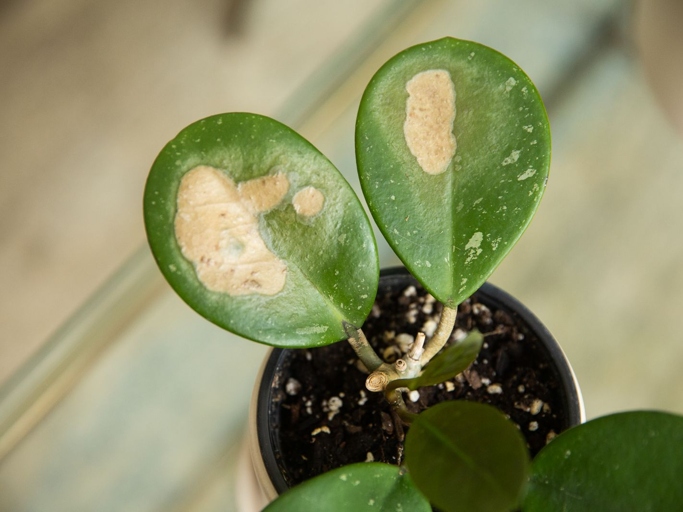
Basil doesn’t like to sit in wet soil, so be sure to water it only when the soil is dry. If your basil is getting too much water, let the soil dry out completely before watering again. Another reason for basil leaves to turn white is too much water.
If your basil seems stressed, try to identify the cause and address it. This can be caused by too much or too little water, extreme temperatures, or pests. Finally, basil leaves can turn white if the plant is stressed.
Pest Infestation
You can also try to attract beneficial insects to your garden, such as ladybugs and lacewings, which will help to control the pest population. Some common pests that attack basil plants include aphids, whiteflies, and spider mites. If you notice your basil leaves turning white, it could be due to a pest infestation. To get rid of pests, you can use a variety of methods, including insecticidal soap, neem oil, or diatomaceous earth. These pests can cause damage to the leaves, stems, and flowers of the plant.
Aphids
Aphids can cause leaves to turn white by sucking out the chlorophyll, which gives leaves their green color. In addition to causing leaves to turn white, aphids can also cause them to curl, distort, and become mottled. They are often found in large numbers on the undersides of leaves, where they feed on plant sap. Aphids can be controlled with a number of different methods, including insecticidal soap, horticultural oil, and neem oil. Aphids are small, soft-bodied insects that can be found in a variety of colors, including green, black, brown, and white.
Solution:
If your basil leaves are turning white, it could be caused by any number of things. But don’t worry, there are solutions for each problem.
Basil needs at least six hours of sunlight each day, so if it’s not getting enough, the leaves will start to turn white. The solution is to move the plant to a spot that gets more sunlight. One common issue is that the plant isn’t getting enough sunlight.
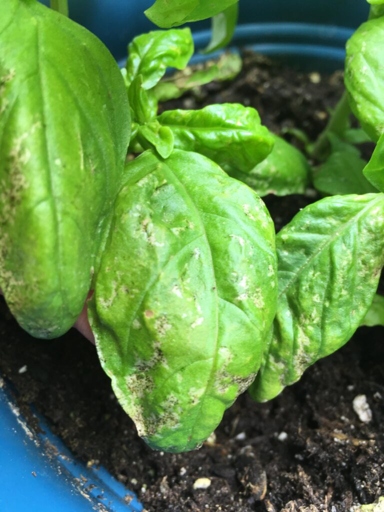
Another issue could be that the plant is getting too much water. The solution is to let the soil dry out between waterings. If the leaves are wilting or the stem is soft, it’s a sign that the plant is getting too much water.
The solution is to fertilize the plant with a balanced fertilizer. If the leaves are turning white and the plant is not getting enough water, it could be a sign of a nutrient deficiency.
They can help you diagnose the issue and find the best solution. If you’re not sure what’s causing the problem, it’s best to consult with a gardening expert.
Nematodes
Nematodes are small, unsegmented worms that are found in nearly every habitat on Earth. Many nematode species are beneficial to plants, but some can cause serious damage. Nematodes that damage plants are called plant-parasitic nematodes.
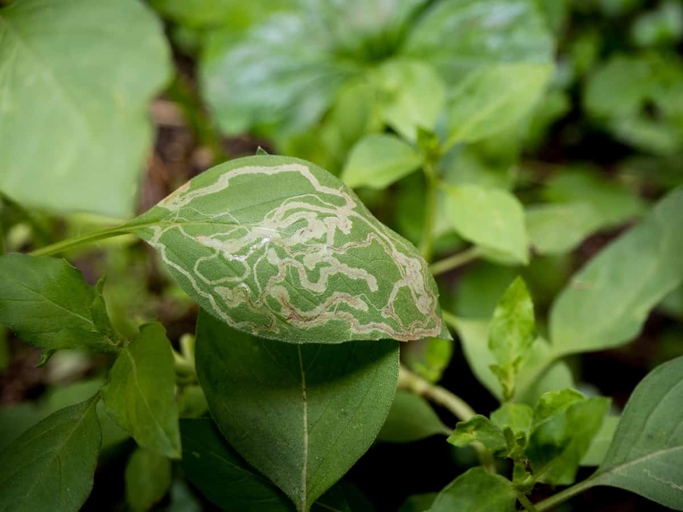
Plant-parasitic nematodes feed on plant roots, which can damage the plant and make it more susceptible to disease. Some plant-parasitic nematodes can also transmit viruses to plants.
There are several ways to control plant-parasitic nematodes. One is to use nematode-resistant varieties of plants. Another is to use chemicals that kill nematodes.
In these cases, it is important to take steps to prevent nematodes from damaging your plants. Some plant-parasitic nematodes are difficult to control and can cause serious damage to crops.
Solution:
If the soil is too dry, the leaves will start to turn white. The most common reason is that the plant is not getting enough water. Make sure to water your basil plant regularly and keep the soil moist. If your basil leaves are turning white, it could be due to one of several reasons.
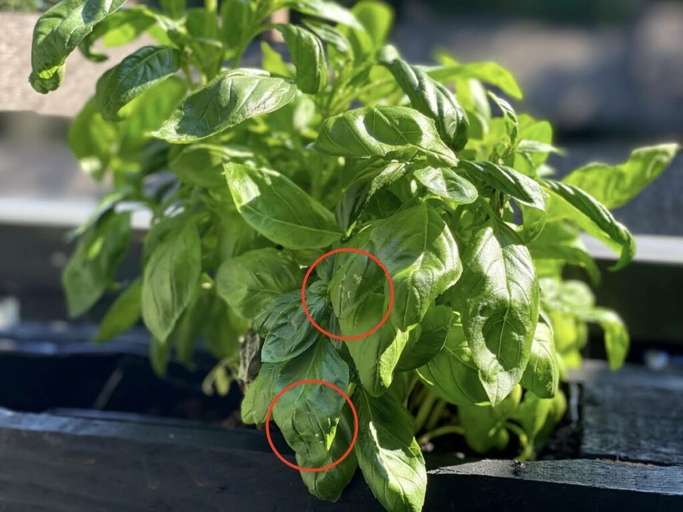
Basil plants need about 6 hours of sunlight per day. Move your plant to a location that gets less sun. If they are getting too much sun, the leaves will start to turn white. Another reason for white leaves could be too much sun.
Make sure you are fertilizing your basil plant regularly. Finally, white leaves could also be a sign of nutrient deficiency. If the leaves are still turning white, you can try adding some Epsom salt to the soil.
White Fly
If you notice your basil leaves turning white, it’s likely due to one of these 13 causes.
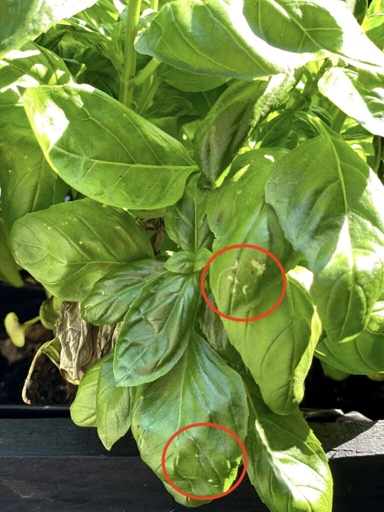
Too Much Water 1.
The best way to avoid this is to water the plants deeply, but less often. Allow the top few inches of soil to dry out before watering again. If you’re watering your basil plants too frequently or giving them too much water at once, the leaves can start to turn white.
Not Enough Water 2.
If your basil plants aren’t getting enough water, the leaves will also start to turn white. Make sure you’re watering the plants regularly and giving them enough water each time.
Nutrient Deficiencies 3.
Make sure you’re fertilizing the plants regularly and using a high-quality fertilizer. If your basil plants are lacking in nutrients, the leaves can turn white.
4. Pest Infestation
Inspect the plants carefully and remove any pests you find. You may also need to treat the plants with an insecticide. If your basil plants are infested with pests, the leaves can turn white.
Disease 5.
Treat the plants with a fungicide or herbicide according to the instructions on the label. If your basil plants are infected with a disease, the leaves can turn white.
6. Too Much Sun
If your basil plants are getting too much sun, the leaves can start to turn white. Move the plants to a shadier spot or provide them with some artificial shade.
7. Too Much Heat
If the temperature is too high, the leaves of your basil plants can turn white. Move the plants to a cooler spot or provide them with some artificial cooling.
Too Much Cold 8.
If the temperature is too low, the leaves of your basil plants can turn white. Move the plants to a warmer spot or provide them with some artificial heating.
Improper Storage 9.
If you’re storing your basil plants in an improper environment, the leaves can turn white. Make sure the plants are stored in a cool, dark, and dry place.
Poor Air Circulation 10.
Move the plants to a spot with better air circulation or provide them with some artificial ventilation. If the air circulation around your basil plants is poor, the leaves can turn white.
Too Much Fertilizer 11.
Cut back on the fertilizer or fertilize the plants less often. If you’re fertilizing your basil plants too frequently or using too much fertilizer, the leaves can start to turn white.
Too Much Salt 12.
Cut back on the salt or stop using it altogether. If you’re using too much salt in your cooking or on your food, the leaves of your basil plants can turn white.
13. Too Much Chemicals
If you’re using too many chemicals on your basil plants, the leaves can turn white. Cut back on the chemicals or stop using them altogether.
Excess Salt
If the leaves are already white, you can try washing them off with fresh water. If your basil leaves are turning white, it could be due to excess salt. When plants are overwatered with salty water, the salt builds up in the leaves and causes them to turn white. The best way to prevent this is to water your plants with fresh water.
Solution:
The leaves will turn white and eventually fall off if the plant is not watered regularly. Finally, basil leaves can turn white if the plant is not getting enough nutrients. Basil leaves are turning white for a number of reasons. The leaves will turn white and eventually fall off if the plant is not getting enough sun. The most common is that the plant is not getting enough water. The leaves will turn white and eventually fall off if the plant is not getting enough nutrients. Another common reason for basil leaves to turn white is that the plant is getting too much sun.
Nutrient Deficiency
However, if the deficiency is severe, it’s best to replant your basil in fresh soil. These nutrients are essential for healthy plant growth and can be found in most commercial fertilizers. The most common nutrient deficiencies in basil are nitrogen, phosphorus, and potassium. If your basil is lacking in one or more of these nutrients, you can try to correct the deficiency by fertilizing your plant. If you notice that your basil leaves are turning white, it’s likely due to a nutrient deficiency.
Solution:
If you’re noticing your basil leaves turning white, it could be due to one of several reasons. But don’t worry, there are solutions for each problem.
If you live in an area with hard water, you may need to use distilled water for your plants. Make sure you’re fertilizing your plants regularly and giving them enough water. One common reason for basil leaves to turn white is due to a lack of nutrients.
If it’s too hot or too cold outside, your basil leaves may turn white. Another reason for basil leaves to turn white is because of temperature stress. Make sure you’re keeping your plants in a location that’s between 65 and 80 degrees Fahrenheit.
If you see white spots on your basil leaves, it could be due to a fungal disease called powdery mildew. To treat this, you can use a fungicide. Be sure to follow the instructions on the label carefully.

With a little care, you can get your plants back to looking their best. If your basil leaves are turning white and you can’t figure out why, try one of these solutions.
Inadequate light
If your basil leaves are turning white, it could be due to a lack of light. Basil needs at least six hours of sunlight each day to thrive. You may also notice that your plant is stretching out or becoming leggy. If your plant is not getting enough light, it will start to produce smaller, paler leaves.
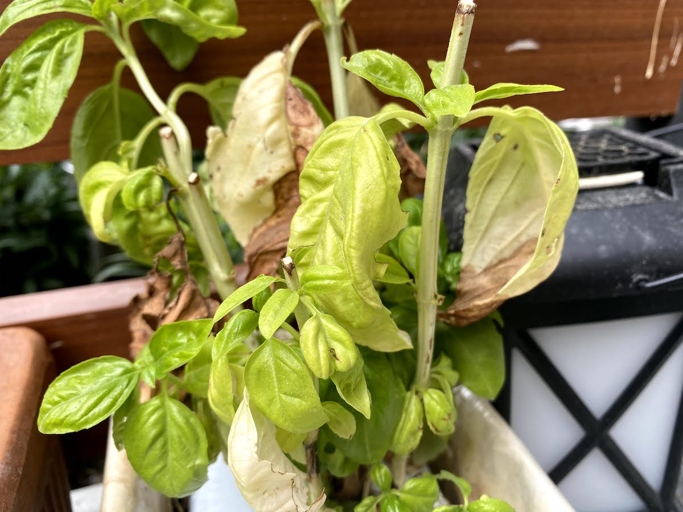
To fix this problem, move your basil plant to a sunny spot. If you can’t provide enough natural light, you can supplement with artificial light. Place your plant under a grow light for 14-16 hours each day.
Solution:
If your basil leaves are turning white, there are a few possible explanations and solutions. One possibility is that the plant is getting too much sun. Make sure to water it regularly and give it a good soaking if the soil is dry. Another possibility is that the plant is not getting enough water. If this is the case, try moving it to a shadier spot.
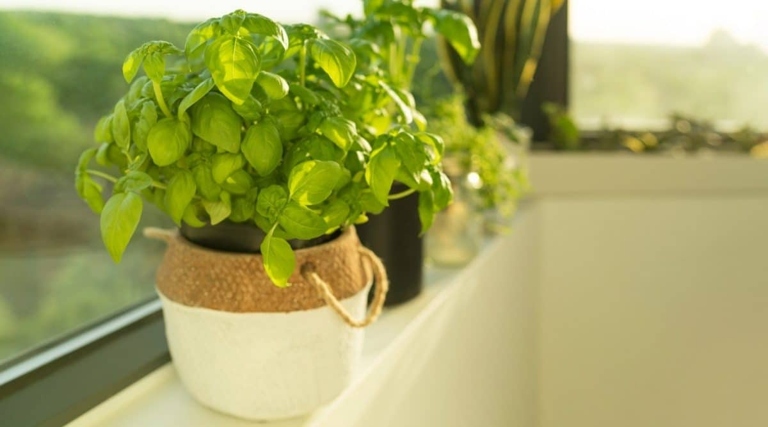
If the leaves are still turning white, it could be a sign of a nutrient deficiency. Try fertilizing the plant with a nitrogen-rich fertilizer and see if that makes a difference. If the problem persists, it might be best to start over with a new plant.
Too Much Sun Exposure
The sun causes the leaves to bleached and can eventually kill the plant. Too much sun exposure is one of the most common causes of basil leaves turning white. Too much sun can also cause the leaves to become crispy and dry. If you notice your basil leaves turning white, move the plant to a shadier spot and make sure to water it regularly.
Solution:
If your basil leaves are turning white, it could be caused by any number of things. But don’t worry, there are solutions for each problem.
Basil needs at least six hours of sunlight per day, so if it’s not getting enough, the leaves will start to turn white. One common issue is that the plant isn’t getting enough sunlight. The solution is to move the plant to a sunnier spot.
The solution is to water the plant less often. If the leaves are wilting or the stem is soft, that’s a sign that the plant is getting too much water. Another problem could be that the plant is getting too much water.
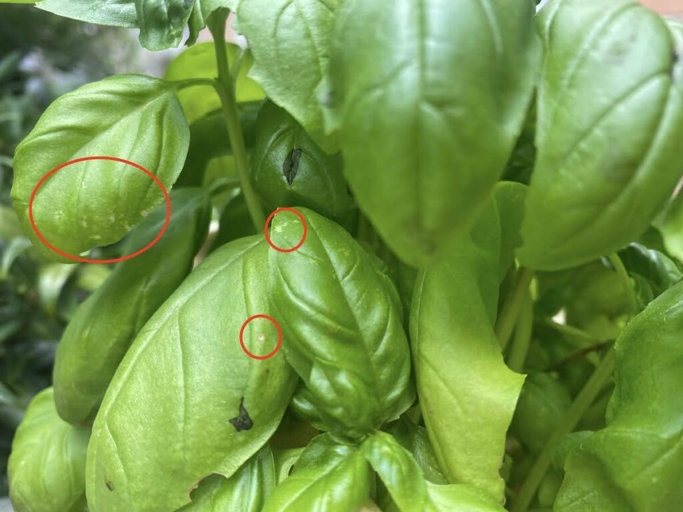
If the leaves are turning white and the plant is not getting enough water, the solution is to water the plant more often.
Finally, if the leaves are turning white and the plant is getting too much water, the solution is to water the plant less often.
Overwatering
If your basil leaves are turning white, it’s likely due to one of these 13 causes:
You’re watering your basil too often. 1.
Water your basil only when the top inch of soil is dry. Basil likes to dry out between waterings.
You’re using too much water. 2.
When you do water your basil, make sure you’re using enough water to reach the roots. Water until you see water draining from the bottom of the pot.
You’re not using a drainage hole. 3.
If your pot doesn’t have a drainage hole, the roots of your basil plant can become waterlogged, causing the leaves to turn white.
You’re using the wrong type of pot. 4.
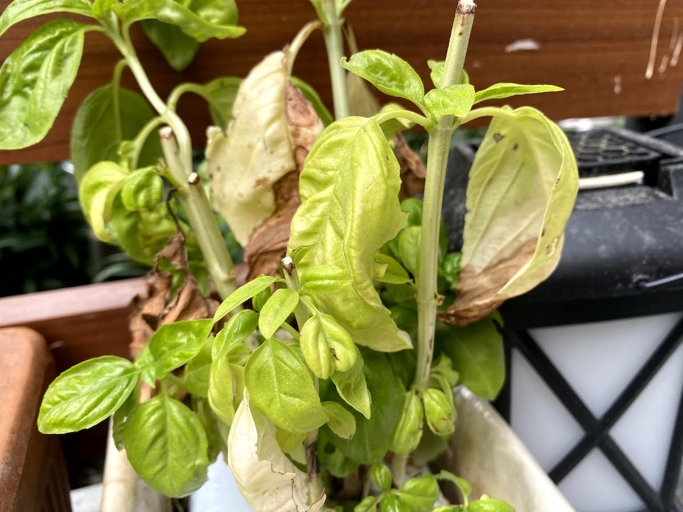
Choose a pot that’s at least twice the size of the plant. If you’re using a pot that’s too small, the roots of your basil plant can become crowded, leading to overwatering.
5. You’re not using a potting mix.
If you’re not using a potting mix, your basil plant is likely to become overwatered. Basil needs a potting mix that drains well.
You’re not fertilizing your basil. 6.
If you’re not fertilizing your basil, it may be turning white due to a lack of nutrients. Basil needs a fertilizer high in nitrogen to thrive.
You’re using the wrong type of fertilizer. 7.
Choose a fertilizer that’s high in nitrogen instead. If you’re using a fertilizer that’s high in phosphorus, it can cause the leaves of your basil plant to turn white.
You’re not pruning your basil. 8.
If you’re not pruning your basil, it may be turning white due to a lack of new growth. Pruning basil helps to encourage new growth.
9. You’re not using the right type of soil.
Basil needs a well-draining soil. If your soil is too dense, it can lead to overwatering and the leaves of your basil plant turning white.
10. You’re not using the right type of container.
Choose a container that’s at least twice the size of the plant. If you’re using a container that’s too small, the roots of your basil plant can become crowded, leading to overwatering.
11. You’re not using the right type of water.
If you’re using water that’s low in calcium, it can cause the leaves of your basil plant to turn white. Basil needs water that’s high in calcium.
You’re not using the right type of light. 12.
If you’re not giving your basil plant enough light, it may be turning white. Basil needs full sun to thrive.
13. You have a pest problem.
Treat your plant with an insecticidal soap or neem oil to get rid of the pests. If your basil plant is infested with aphids, whiteflies, or other pests, it may be turning white.
Solution:
If your basil leaves are turning white, it could be caused by any number of things. But don’t worry, there are solutions for all of them!
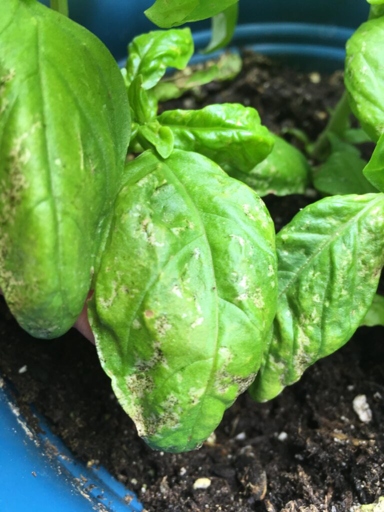
If your plant isn’t getting enough light, the leaves will start to turn white. One common reason for basil leaves to turn white is because of a lack of sunlight. The solution is simple – just move your plant to a spot that gets more sunlight.
If you’re watering your basil plant too often, the leaves can start to turn white. The solution is to cut back on watering and let the soil dry out more between watering. Another reason for white leaves can be too much water.
The solution is to treat the plant with an insecticide. Finally, white leaves can also be caused by pests or diseases. The solution is to treat the plant with a fungicide. If you see any white spots on the leaves, it’s likely that your plant is infested with pests. If the leaves are turning white and falling off, it’s likely that your plant has a disease.
Underwatering
There are a few things you can do to prevent this from happening. One of the most common problems when growing basil is underwatering. The leaves will start to turn white and eventually die if the plant doesn’t get enough water.
It’s best to water it every day, or at least every other day. If you’re not sure how much water your plant needs, check the soil before watering. First, make sure you’re watering your basil regularly. If it’s dry, give it a good drink.
If you think you may have underwatered your basil, try to give it a deep watering. This means watering the plant until the water runs out of the bottom of the pot. This will help to saturate the roots and prevent the leaves from turning white.
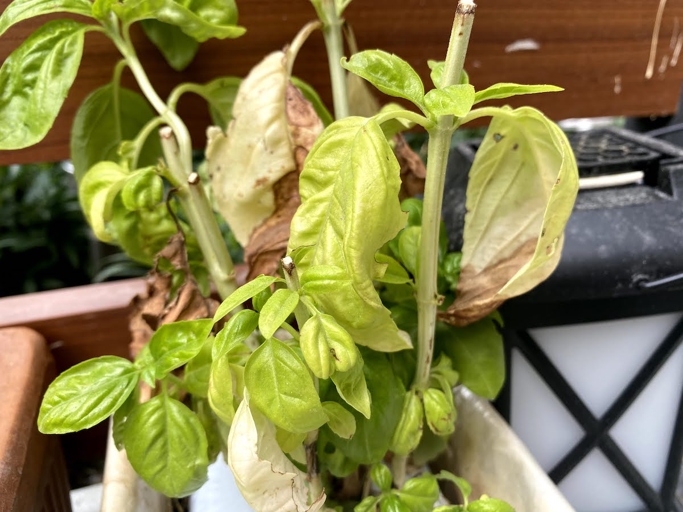
If you don’t have a well-draining pot, you can add some gravel or rocks to the bottom of the pot to help with drainage. Basil doesn’t like to sit in wet soil, so a pot with drainage holes is essential. Finally, make sure you’re using a well-draining pot.
Solution:
If your basil leaves are turning white, it could be caused by any number of things. But don’t worry, there are solutions for each problem.
One common issue is that the leaves are getting too much sun. If this is the case, simply move your plant to a shadier spot.
Another possibility is that the leaves are being burned by chemicals in the soil, such as herbicides or fertilizers. If you think this might be the problem, flush the soil with water to remove the chemicals.
If this is the case, you’ll need to treat the plant with a fungicide. Finally, white leaves can also be a sign of a fungal disease.
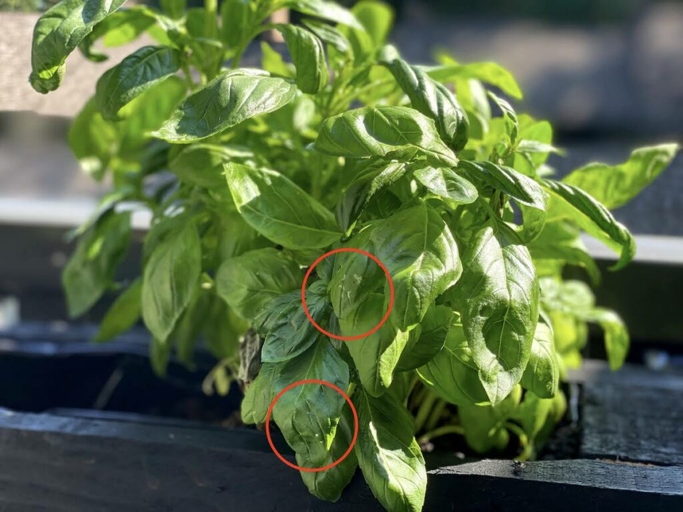
If you’re not sure what’s causing the problem, take a sample of the leaves to your local nursery or Cooperative Extension office for diagnosis. With the right solution, your basil plant will be back to its healthy self in no time.
Wrong Soil Type
The best soil type for basil is a well-drained, sandy loam. You can improve the drainage of your soil by adding organic matter, such as compost, to it. If your basil leaves are turning white, it could be because of the wrong soil type. If your soil is too heavy or too clay-like, it could be causing the leaves to turn white. You can also try growing basil in a pot with a well-drained potting mix. The wrong soil type can cause the leaves to turn white and can also stunt the growth of the plant.
Solution:
If your basil leaves are turning white, it could be due to one of many different causes. But don’t worry – there are solutions for each problem!
If you live in an area with hard water, you may need to use distilled water for your plants. Make sure you are fertilizing your plants regularly, and giving them enough water. One common reason for basil leaves to turn white is because of a lack of nutrients.
Another reason for basil leaves to turn white is because of too much sun exposure. If your plants are getting too much direct sunlight, try moving them to a shadier spot.
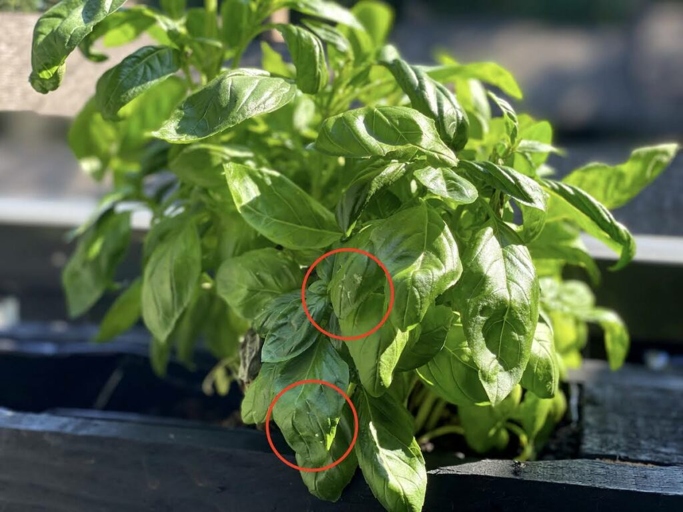
If you see any, treat your plants with an appropriate insecticide. Check your plants for signs of aphids, whiteflies, or other pests. If your basil leaves are turning white and falling off the plant, it could be because of pests.
Finally, if your basil leaves are turning white and the plant is wilting, it could be because of a fungal disease. Treat your plant with a fungicide, and make sure to remove any affected leaves.
Close to a Heat Source
Basil likes warm weather, but it can’t tolerate direct heat from a sun lamp, radiator, or other source. If your basil leaves are turning white, it could be due to a number of factors. One possibility is that the plant is too close to a heat source. If your plant is close to one of these, move it to a cooler spot.
Basil likes to stay moist, but too much water can cause the leaves to turn white. Make sure you’re not over-watering your plant, and let the soil dry out a bit between waterings. Another possibility is that the plant is getting too much water.
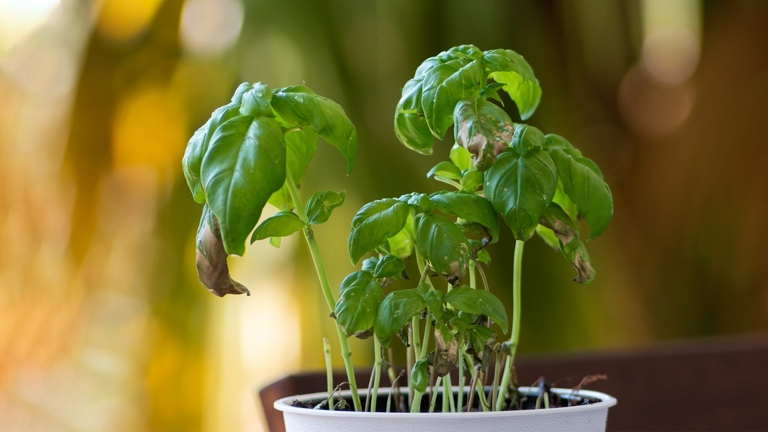
Try fertilizing your plant with a balanced fertilizer, and be sure to give it plenty of sunlight. Finally, white leaves can also be a sign of a nutrient deficiency. If your plant isn’t getting enough nitrogen, magnesium, or other nutrients, the leaves may turn white.
Solution:
But don’t worry, there are solutions for each problem. If your basil leaves are turning white, it could be due to one of several causes.
This can be easily fixed by adding a nitrogen-rich fertilizer to your plant’s soil. One common reason for basil leaves to turn white is due to a lack of nitrogen.
Another reason for basil leaves to turn white is because of too much sun exposure. If this is the case, simply move your plant to a shadier spot.
If your basil leaves are turning white because of pests, the solution is to treat your plant with an insecticide.
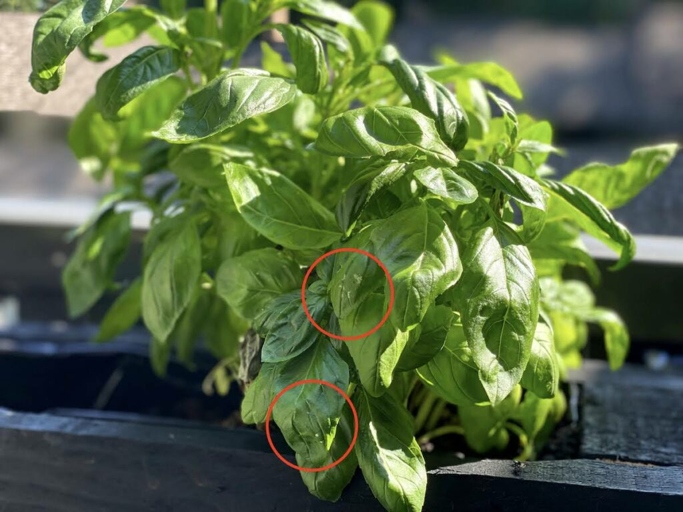
Finally, if your basil leaves are turning white because of disease, the best solution is to destroy the affected plant and start over with a new one.
Frequently Asked Questions
1. Why are my basil leaves turning white?
There are a number of reasons why basil leaves may turn white. These include:
– too much sun exposure
– not enough water
– pests or disease
– nutrient deficiencies
– genetic factors
2. What does it mean if the tips of my basil leaves are turning white?
If the tips of your basil leaves are turning white, it is likely due to too much sun exposure. Basil plants need 6 to 8 hours of sunlight per day, so if they are getting more than this, the leaves may start to turn white.
3. Why are the edges of my basil leaves turning white?
If the edges of your basil leaves are turning white, it could be due to a lack of water. Basil plants need to be watered regularly, especially during hot weather. If the leaves are wilting or the soil is dry, it’s time to water your plant.
4. Why are the veins of my basil leaves turning white?
If the veins of your basil leaves are turning white, it could be a sign of a nutrient deficiency. Basil plants need a balance of nitrogen, phosphorus, and potassium. If one of these nutrients is lacking, it can cause the veins to turn white.
5. Why is the whole leaf of my basil plant turning white?
If an entire leaf of your basil plant is turning white, it is likely due to a pest or disease. Check the leaves for signs of insects or fungal growth. If you see any, treat the plant with an appropriate pesticide or fungicide.
6. Is it normal for some of my basil leaves to turn white?
Yes, it is normal for some of the leaves on a basil plant to turn white. This is usually due to genetic factors and is nothing to worry about.
7. What can I do to prevent my basil leaves from turning white?
There are a few things you can do to prevent your basil leaves from turning white. These include:
– water regularly
– provide adequate sunlight
– fertilize regularly
– avoid over-exposure to sunlight
– pest and disease control
Final thoughts
If your basil leaves are turning white, it could be due to one of many different causes. But don’t worry, there are also many solutions! With a little investigation and some trial and error, you should be able to figure out what’s causing the problem and how to fix it.
